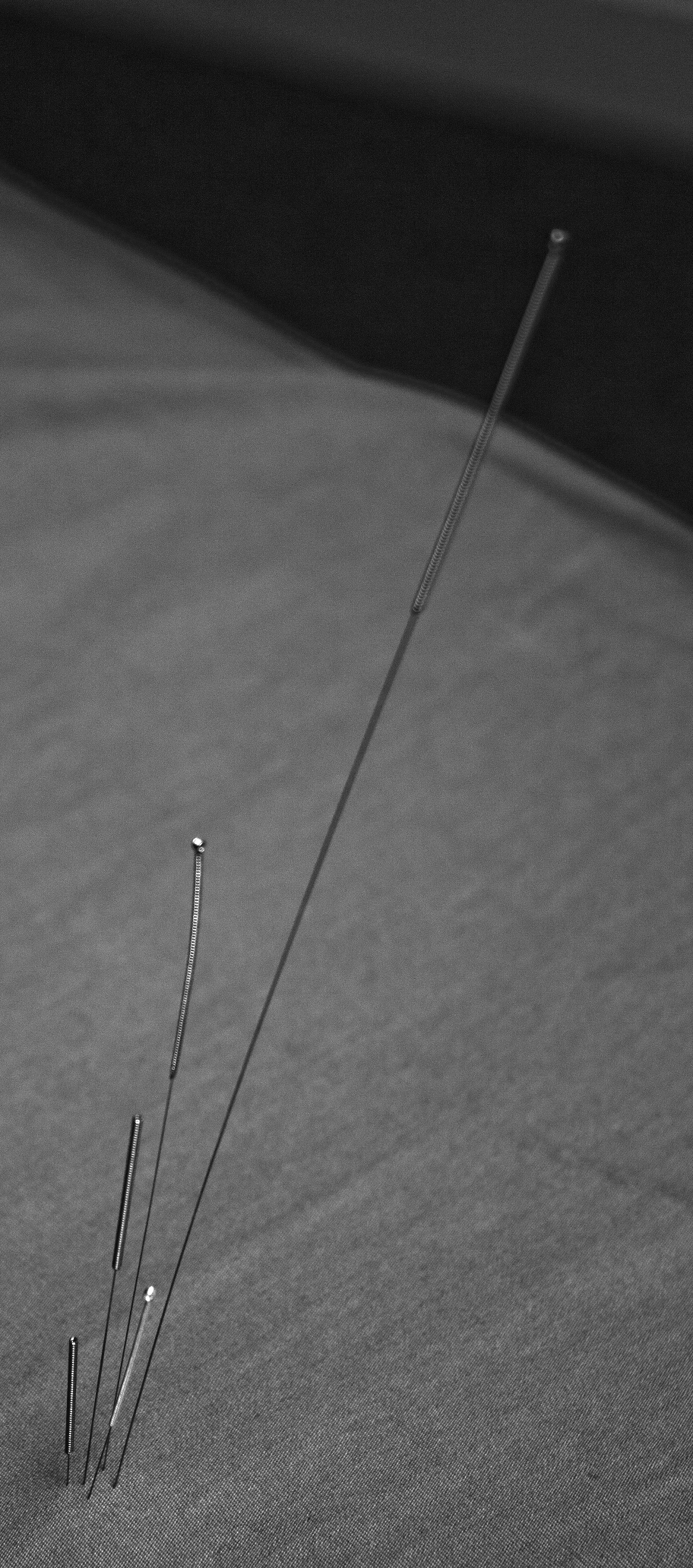Q: Does it hurt?
A: This is probably the number one question in acupuncture clinics across the country. And, like the intricacies of the medicine, the answer is varied. Typically the needle is inserted through the skin with little or no discomfort. There are certain things that make a person more sensitive to needling. These are: current cold or flu, smoking cigarettes, and drinking more than 4 caffeine drinks prior to treatment.
Q: What will I feel?
A: You may feel nothing at all. However, it is more likely that you will feel some sort of stimulation with each needle placement. This stimulation can come in many forms, such as: warmth, tingling, achy or any number of other sensations. These feelings last only for a brief moment before evaporating from your mind. It is not uncommon for people to feel groggy or drowsy following an acupuncture treatment. This is what we call ‘acu-land.’
Q: How big are the needles?
A: Depending on the area being treated the needles vary in length from about ½ inch to 6 inches. The smaller needles are used for the scalp and ears while the longer ones are used for getting into the hips for hip and low back pain. In terms of thickness, the needles used range from 32 to 28 gauge, where the smaller the number the larger the diameter of the needle. To place this into context, four acupuncture needles will fit into the opening of a needle used for vaccinations.
Q: Can I catch a disease from the needles?
A: No. In this day and age it is more economically feasible to use disposable needles. Needles are individually wrapped and sterilized by the manufacturer and are opened only when they are ready to be used. After use each needle is disposed of in a medical waste container for destruction in the appropriate manner.
Q: Is there any danger involved with acupuncture?
A: No one has ever died from acupuncture applied by a trained and licensed practitioner. Not a bad track record when you consider the medicine is guesstimated to be slightly more than 5,000 years old. It is unlikely, but not unheard of, for patients to exhibit an allergic reaction to the sterilizing agent (ethylene oxide). If a needle nicks a tendon or nerve there could be some residual pain and soreness for a matter of weeks, but it will subside. It is possible to experience some bruising; especially in people who are prone to bruising… it is a needle, after all.
Q: How long before I notice a change in my symptoms?
A: The feeling of relief of your symptoms will depend greatly on what you are being treated for, whether the condition is chronic or acute, your age, and your schedule following treatment. Younger people tend to respond quicker to acupuncture than the elderly – children respond amazingly well. Typically you will notice some sort of change within a 24-hour period.
Q: How long can I expect the effects of acupuncture to last?
A: This again depends on the nature of your disease or disorder and your age. Acute pain is quicker to resolve than chronic pain, for instance. Repetitive motion injuries, such as those created by your work or play habits will get better, but may return once you go back to those old postural or procedural motions. To this end, each patient receives treatment plus education and stretching exercises to help prevent further injury or strain to the system.
Q: I’m taking blood thinners – can I still try acupuncture?
A: Yes. We have treated many people under the care of a cardiologist, stroke victims and the elderly. Blood thinners can make a person more likely to bleed, but of 15 to 20 needles only one may provide a drop of blood.
Q: Does it really work? What about placebo?
A: Millions of people across the globe use acupuncture. In some cultures it is a primary medical modality. That’s a bit much to be a fad, don’t you think?
As far as placebo goes, here’s our two cents: Does it really matter? Say you are in acute pain. Pain that is so miserable it makes your daily life difficult or impossible to get through. You decide to add acupuncture to the growing list of pharmaceuticals you are taking for relief and suddenly you start to feel better. Do you really care what made you feel better? It was either the acupuncture or your belief that the acupuncture would work. In either case, you are better. In the end it is the resolution of the symptoms that indicate successful treatment. Don’t put too much thought into placebo. The mind can do amazing things and we want it on our side.
Q: Does my insurance cover acupuncture?
A: Many insurance companies do cover acupuncture. Our clinic is on many insurance panels in Oregon, and we work successfully with Personal Injury Protection for acupuncture benefits. Go to your insurance company web site or call the number listed on your card for further information. You will want to get specific answers to the following questions:
Is acupuncture a covered benefit on my current insurance plan?
What is my total benefit (i.e. how many treatments per year, or dollar amount)?
What is my deductible?
Have I met any of that deductible this year?
Another option is to simply bring in your insurance card to your first visit. With the information on your card, your birth date and social security number we can call the insurance company and get that information for you.
Please note: if you have been in an automobile accident within the last 12 months and are currently undergoing chiropractic, physical therapy, or other medical care for injuries sustained you can use your PIP benefits for acupuncture treatment. What’s more, you do not need a referral to do so.
